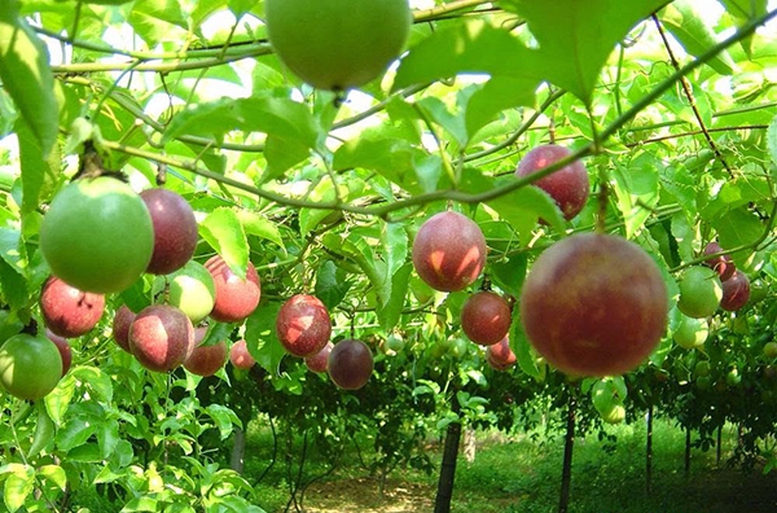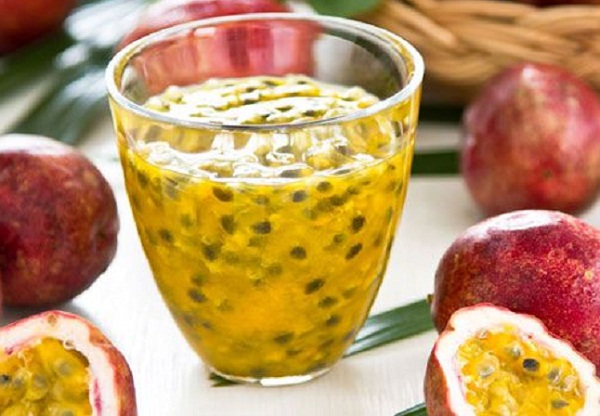This tropical fruit is loaded with antioxidants, fiber, vitamins, minerals, and other beneficial plant compounds that can help improve your health.
Passion fruit, also known as passion fruit, is the fruit of a legume; a beautiful flowering vine native to South and Central America, the West Indies and Australia.
There are over 550 different species of passion fruit harvested around the world. The most common are the purple or pale yellow passion fruit.
When buying passion fruit, choose those with slightly wrinkled skin – this is a sign that the fruit is ripe.
1. Nutritional value of passion fruit

Passion fruit is a nutritious food.
Passion fruit is an excellent source of fiber, vitamins and minerals, especially vitamins C and A.
- Calories: 17
- Carbohydrates: 4.2g
- Fiber: 2g
- Protein: 0.4g
- Vitamin C: 6% Daily Value (DV)
- Vitamin A: 5% DV
- Iron: 2% DV
- Copper: 2% DV
- Potassium: 1% DV
- Magnesium: 1% DV
A study from the University of Reunion (France) showed that passion fruit is also a rich source of polyphenol antioxidants, more than bananas, mangoes, lychees and pineapples, etc.
2. 8 Health Benefits of Passion Fruit
Due to its high phytochemical fiber content, passion fruit has a wide range of health benefits, from preventing some common diseases to promoting optimal health. Let’s take a look at some of the best attributes of this tropical fruit and the plant compounds in passion fruit that affect health.
2.1 Passion fruit is rich in vitamin C
Vitamin C is an essential vitamin that your body cannot produce or store on its own – so you need to get plenty of it through your diet. Vitamin C is needed for various bodily functions, including the growth and repair of tissues and bones. Vitamin C also helps increase iron absorption. This is important, as your body often does not absorb iron from plants well.
2.2 Passion fruit is rich in vitamin A
Passion fruit contains an impressive amount of vitamin A. Vitamin A is a fat-soluble vitamin that helps maintain a healthy immune system. Vitamin A is essential for vision, skin, bones, and cell regeneration. Vitamin A is stored in your body, mainly in the liver. Passion fruit also contains beta-carotene, which is converted to vitamin A in our bodies when needed.
2.3 Passion fruit is high in fiber
Fiber is important for a healthy gut. One passion fruit provides 2 grams of fiber, most of which is soluble fiber, which turns into a gel-like substance during digestion. This slows down digestion, preventing spikes in blood sugar. Soluble fiber also reduces the amount of fat your body absorbs. A high-fiber diet aids digestion and reduces the risk of metabolic diseases such as heart disease, diabetes, and obesity.
2.4 Passion Fruit is a Rich Source of Antioxidants
Passion fruit is rich in antioxidants. Antioxidants protect your cells from free radicals, which are unstable and potentially harmful molecules. When free radicals accumulate, they cause a condition called oxidative stress, which can damage fat tissue, DNA, and proteins in your body. Free radicals contribute to the aging process and have been linked to diseases such as cancer, heart disease, and Alzheimer’s disease.
The most prominent antioxidants in passion fruit are:
- Vitamin C: Also known as ascorbic acid, consuming a lot of vitamin C can increase your blood antioxidant levels by 39.5%.
- Beta-carotene: A precursor to vitamin A, it can be converted to retinol in the liver.
- Polyphenols: These are anti-inflammatory plant compounds. Passion fruit seeds are rich in piceatannol, which has been shown to improve insulin sensitivity in overweight men.

Passion fruit contains many plant compounds that act as antioxidants.
2.5 Passion fruit is rich in potassium
Potassium is an essential mineral that your body cannot produce on its own, so it needs to be supplied through food sources. Potassium is needed for nerve and muscle function as well as your blood pressure. Potassium acts as an electrolyte – a mineral with an electrical charge – potassium conducts electrical impulses that control important body functions, such as the muscles that control your heart rate and breathing.
2.6 Passion fruit is high in magnesium
Every cell in your body needs magnesium to function. Magnesium is involved in more than 300 important chemical reactions, from converting food into energy to repairing DNA, and magnesium deficiency has been linked to a number of chronic diseases. Just 100g of passion fruit will provide you with 7% of your daily magnesium needs.
2.7 Passion fruit has a low glycemic index
The glycemic index (GI) measures how quickly a given food raises blood sugar levels. Foods are classified as low, medium or high GI foods and are ranked on a scale of 0 to 100. Passion fruit has a value of 30, which is in the ‘low’ range, meaning its carbohydrates are absorbed slowly.
As a result, your blood sugar levels rise slowly, rather than spiking. Over time, high and sudden blood sugar spikes can damage organs, nerves and blood vessels, increasing the risk of heart disease, stroke and type 2 diabetes.
2.8 Passion fruit fights inflammation
In a study from McMaster University (Canada), people with knee osteoarthritis who took purple passion fruit peel extract had less pain and stiffness, as well as better physical function than the control group. This needs more research, but it certainly looks promising.
3. Side effects of passion fruit to be cautious about
Although passion fruit is generally safe to eat, it can cause allergic reactions in some people. People with latex allergies are at the highest risk of having a reaction to passion fruit, because some of the plant’s proteins have a structure similar to that of latex proteins.
Additionally, passion fruit contains small amounts of a toxin called cyanogenic glycoside. It is most concentrated in certain varieties of passion fruit peel, as well as the pulp of unripe passion fruit. Cyanogenic glycoside can cause cyanide poisoning in large amounts, so avoid eating large amounts of unripe fruit and do not eat the peel unless it has been extracted and processed as a dietary supplement.





